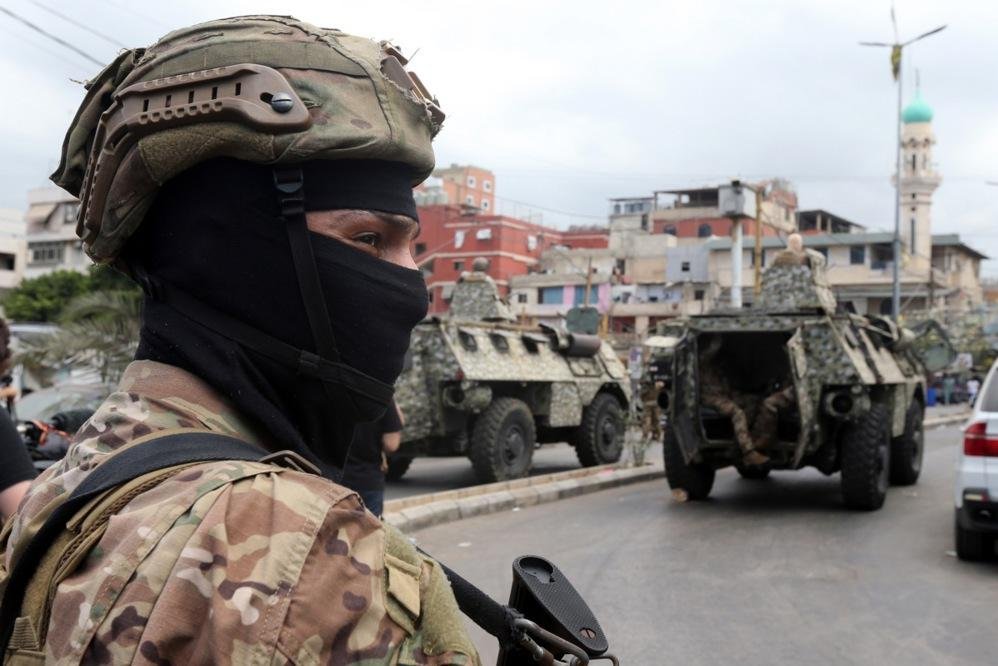Lebanese soldiers stand guard at the entrance of the Burj Barajneh Palestinian refugee camp in southern Beirut on Friday. The Lebanese army received a new batch of Palestinian weapons in the Burj Barajneh camp following a disarmament deal reached in May. Photo by Wael Hamzeh/EPA
BEIRUT, Lebanon, Aug. 29 (UPI) — The extension of the United Nations peacekeeping force in Lebanon for one final time — before its mission ends after five decades of seeking to maintain peace in the embattled southern region — marks a turning point in Lebanon’s struggle to reassert state control and avert another devastating war with Israel, according to a French diplomat and a Lebanese military expert.
On Thursday, the U.N. Security Council voted unanimously to terminate the U.N. Interim Force in Lebanon, or UNIFIL, which was established in March 1978 after Israel’s first invasion of southern Lebanon.
The United States, which had pushed for the multinational peacekeepers to end their mission within six months in line with the demands of its close ally Israel, agreed to a 16-month extension — until the end of December 2026. After that, UNIFIL will begin a “safe and orderly” withdrawal, to be completed within one year.
The U.S. shift in position was the result of extensive diplomatic efforts led by France, which was the driving force behind creating the peacekeeping force more than 47 years ago.
“It was a complete success, especially given the U.S.’s high-stakes demands and Israel’s push to end UNIFIL’s operations immediately,” a French diplomatic source told UPI.
The source explained that the extension of the force’s operations was intended to help the Lebanese Army complete the task of extending state authority over all Lebanese territory, in accordance with Resolution 1701. It was also meant to “recognize the value and importance” of UNIFIL’s role and to provide a “logical deadline” for its eventual dismantling.
Terminating the role of the U.N. Interim Force “is no longer a taboo,” the diplomatic source said, adding that “the goal of returning Lebanese territories” occupied by Israel remains.
The force grew significantly in size and scope after the 2006 Israel-Hezbollah war, counting 10,500 peacekeepers from 47 to 50 troop-contributing countries.
According to retired Lebanese Brig. Gen. Hassan Jouni, Thursday’s voting came in Lebanon’s favor and would not have been possible without Washington’s consent, despite the United States previously considering the force “useless” and being unwilling to fund it as part of President Donald Trump‘s broader decision to slash funding for the U.N.
Israel has been strongly criticizing UNIFIL for failing to fulfill its mission, accusing the peacekeepers of allowing Hezbollah to strengthen its military presence in southern Lebanon since 2006 in violation of Resolution 1701.
Israel, too, Jouni said, has failed to respect the international resolution, repeatedly violating Lebanon’s sovereignty since 2006.
He acknowledged that the UNIFIL could not force the implementation of Resolution 1701 and could not stop violations from both sides — by Israel and Hezbollah.
Tensions escalated further when Hezbollah opened a support front for Gaza on October 8, 2023, triggering cross-border clashes with Israel. In September, Israel launched a devastating war against Hezbollah, killing several of its top leaders and military commanders, and destroying much of its military infrastructure.
Despite a cease-fire agreement brokered by the United States and France on Nov. 27, Israel continued targeting Hezbollah positions and Lebanese areas, insisting on the group’s full disarmament before complying with the cease-fire terms, which included withdrawing from five strategic posts it still occupies, halting airstrikes and releasing Lebanese detainees captured during the war.
Although the Lebanese government accepted a U.S.-proposed plan to disarm Hezbollah and tasked the Lebanese Army with preparing a strategy to enforce a state monopoly on weapons by the end of the year — a move rejected by Hezbollah — Israel refused to budge, insisting on concrete disarmament steps before taking any reciprocal action.
“Such a U.S. plan, which includes procedural provisions, exceeded Resolution 1701 and further marginalized UNIFIL,” Jouni told UPI. “Today, there is a clear international determination to resolve the situation in southern Lebanon — either by achieving stability in accordance with the U.S. plan or by resuming the cycle of violence to enforce a different form of stability.”
In clear terms, either Hezbollah relinquishs its weapons willingly or faces another Israeli destructive war.
However, Hezbollah is “too weak, highly exposed and deeply wounded to wage war,” according to Jouni. “We should admit that we live today in an era of Israel’s military supremacy and despotism.”
Without UNIFIL, Lebanon would lose an international “credible witness” and supporter; one that has been recording Israeli violations and aggressions over the years. “And this is something that Israel doesn’t like,” the military expert said.
Keeping UNIFIL, even temporarily, was also a meaningful step that was seen as pushing back against Trump’s efforts to sideline the U.N. and diminish its role in addressing global crises.
It’s about recognizing the U.N.’s global role and defending it as a major international institution,” the French diplomatic source said. “This isn’t just about Lebanon or the region — it also relates to Russia, Ukraine and China … as well as the fate of peacekeeping missions.”

